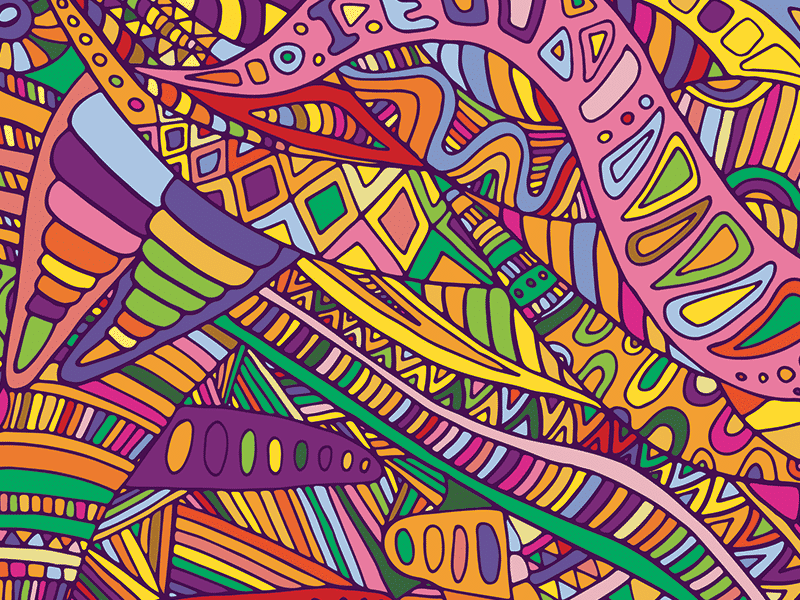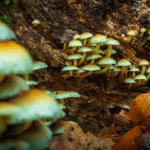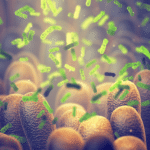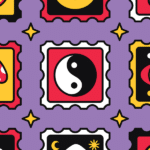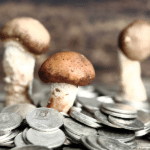The latest wave of psychedelic research has led to many significant breakthroughs in a short span of time. Yet this complex and mysterious field remains in relative infancy, with a number of key subjects still poorly understood. Among these, perhaps no question is more central – nor of more interest to modern pharmaceutical companies – than that of the therapeutic value of the psychedelic experience.
What is it about psychedelics that seems to make them so useful for helping to treat depression, addiction, and other mental health disorders? Is it the drug alone, acting physiologically on the brain, or is it the lived, subjective response engendered by the drug?
New research into the treatment of obsessive-compulsive disorder (OCD) with psilocybin, the active ingredient in magic mushrooms, may help to unravel this riddle.
Hard to Let Go
Three studies are currently investigating the use of psilocybin to reduce symptoms of OCD, a condition that has otherwise received relatively little attention in psychedelic research to date. Although the studies employ different treatment protocols, their combined evidence could prove pivotal in helping researchers better understand the therapeutic mechanism of psychedelic drugs.
That’s because OCD is generally characterized by a failure to surrender or release control – exactly what a full psychedelic experience typically demands. “People with OCD are trying to control their experience in a way that becomes very, very counter-productive, and very painful,” says Adam Strauss, a New York-based comedian who used psychedelics to overcome OCD. “OCD is really a disorder of control.”
Strauss chronicled his experience in the award-winning one-man stage show The Mushroom Cure. “For me,” he explains, “the experience of surrendering, of not trying to change my internal experience, not trying to get rid of the thoughts, not trying to get rid of the sensations, seems like the key factor in psychedelic healing. It’s that subjective experience of letting go and surrendering and allowing.”
While Strauss experimented with and achieved some benefit from low and moderate doses, he found that higher doses, particularly of psilocybin mushrooms, were most effective at teaching him to “let go” – and thus offered the most therapeutic value. “It’s hard for me to imagine having the outcomes I’ve had without those experiences that seem so essential,” he said.
A Pioneering Study
Strauss first got the idea to treat his OCD with psychedelics from a pioneering 2006 study in the Journal of Clinical Psychiatry. Nine patients were administered psilocybin up to four times each, at doses ranging from “very low” to “frankly hallucinogenic.” Not only did all nine show immediate improvement in OCD symptoms following at least one of the testing sessions, but the drug was also proven safe and well-tolerated. (Interestingly, and contrary to Strauss’ subsequent experience, the researchers did not find dose size to have a significant effect on outcomes.)
To this day, that study stands as the only of the modern era to investigate the use of psilocybin to treat OCD. But within the next couple of years, it will be joined by at least three more. One of these is being led by University of Arizona professor of psychiatry Francisco Moreno, the same researcher who directed the groundbreaking and now highly cited 2006 study.
Launched in October 2017, Moreno’s new study – this time with 15 subjects – has been on hold since early 2020 due to the coronavirus pandemic. But it should be restarting soon, Moreno reported in an email. “We have people who are ready to go and my hope is that we will start dosing this Spring if COVID restrictions match our institutional requirements and our ability to do this consistent with the customary settings and presence of two sitters in the room for extended periods of time,” he wrote.
To gain greater insight into how physiological changes in the brain and subjective psychedelic experience may be associated with therapeutic benefit for OCD following low and high doses of psilocybin, Moreno’s team will analyze both brain scans and patient responses to a variety of standardized questionnaires, including the 5-Dimensional Altered States of Consciousness Rating Scale and the Mystical Experience Questionnaire.
This should allow the researchers to determine if any improvements in OCD symptoms observed up to six months after the last dose are more closely aligned with patients’ experience of the drug or with specific aspects of brain activity following treatment. The study should be complete by the end of 2021, Moreno said.
High-Dose Therapy
Meanwhile on the other side of the country, a second, larger study with 30 participants is underway at Yale University – and not far behind. Principal investigator Benjamin Kelmendi, an assistant professor of psychiatry, said the study has already resumed after a nine-month pause for COVID and is now enrolling subjects, with a projected completion date of early 2022.
Like Moreno’s study, Kelmendi’s will measure the effects of psilocybin – in this case just a single, high dose – in both objective and subjective terms, and then compare those effects to clinical outcomes for OCD. This will permit the researchers to determine whether, across the study population, degree of improvement is more accurately predicted by changes in brain connectivity as measured by fMRI, or by self-reported subjective experience.
Another way in which the two studies are alike (and distinct from most other recent and ongoing studies investigating psychedelics as treatments for mental health disorders like addiction and depression) is that they won’t include any form of talk therapy. Instead, as in Moreno’s first, pilot study, any beneficial effect will be directly attributable to the pharmacology of the drug and the changes it causes in the brain, the psychedelic experience it precipitates, or some combination of the two.
That’s not the case with the third concurrent study into psilocybin and OCD, being led by renowned psychedelic researcher David Nutt at Imperial College London’s Centre for Psychedelic Research. Nutt’s new study will pair a moderate dose of psilocybin – low enough that it is not expected to provoke a traditional psychedelic experience – with a form of talk therapy widely used for OCD called Acceptance and Commitment Therapy. This therapy will not take place under the influence of the drug, but rather after its most direct effects have worn off, during “integration” of the treatment, Nutt said in an email.
A Big Challenge
In an online talk discussing the new study last May, Nutt acknowledged that based on findings from his previous research into the treatment of depression with psilocybin, he would expect that higher, more psychedelic doses would be more effective at treating OCD – with the subjective experience playing at least a partial role.
“It’s a big challenge to take a trip, or something you’ve never had before, and possibly go somewhere that could be very dark and unpleasant, but the depressed people have agreed to do it,” Nutt said in the talk. “They’ve often been very anxious about it, but when they’ve done it, they’ve usually come back and said, ‘Wow, that was tough, but I’m glad I did it.’”
Nevertheless, Nutt and his collaborators decided not to offer a high dose this time around after determining early on that members of the OCD patient population weren’t interested. “They made it clear that they would not accept a ‘full’ dose,” Nutt confirmed in an email to Project CBD.
So the research team pivoted to a slightly different model of treatment, one in which subjects will “still be in control” throughout the entire process. Ideally, they will also be primed by the drug on some level to be more receptive to targeted therapy immediately afterward, Nutt said in the video: “We call it psychedelic-enhanced psychotherapy.”
Recruitment for the full study begins in April 2021.
Acceptance & Surrender
Adam Strauss believes his own healing was enabled by higher doses and powerful subjective experiences, but he still sees the potential for significant therapeutic value in moderate doses paired with Acceptance and Commitment Therapy. ACT is a form of cognitive behavioral therapy that he underwent for years, without much success – until he combined his hard-earned knowledge of its key principles with self-directed use of psychedelics.
“I wasn’t actually able to do that sort of acceptance and surrender until I began using psychedelics,” he said. “A lot of my key experiences on psychedelics were me basically doing these ACT techniques while I was tripping.”
Though the Imperial College study’s smaller dose is not expected to produce a full psychedelic experience in patients, the researchers will still measure subjective responses to psilocybin through questionnaires, allowing them to correlate perceived effect with therapeutic benefit.
But beyond the specific findings of any single study, looking at all three studies together could yield the greatest insight into the treatment of OCD with psychedelics and the larger question of the therapeutic value of “the trip.” Are high-dose or high-effect experiences that involve “letting go” truly better for treating OCD in the long term? Or is a moderate, controlled trip followed by talk therapy just as effective – or more so?
With drug companies already obsessed over the prospect of developing trip-free (or at least bad-trip-free) psychedelics, the issue is more than just academic. For better or worse, it has major implications for fledgling efforts to commercialize and medicalize psychedelic drugs. If these three studies go as planned, in another year or so we may have a better idea about whether the psychedelic experience will be viewed as a feature or a bug by the medical establishment.
Nate Seltenrich, Project CBD contributing writer, is the author of the column Bridging the Gap. An independent science journalist based in the San Francisco Bay Area, he covers a wide range of subjects, including environmental health, neuroscience, and pharmacology. © Copyright, Project CBD. May not be reprinted without permission.
Recommended Readings
Amazing: Psychedelics & Phantom Limb Pain
An unusual case report illuminates the therapeutic potential of psilocybin for neuroplasticity.
CBD & the Psychedelic Receptor
CBD and LSD bind to the same serotonin receptor, which mediates psychedelic altered states.
Psychedelics & Cannabis Therapeutics
High doses of THC are hallucinogenic, and microdosing LSD is a lot like CBD.



